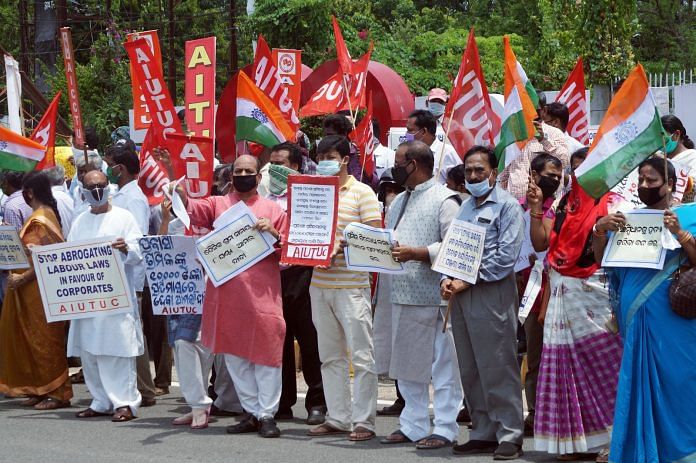New Delhi: The Economic Survey tabled Tuesday says that the four labour codes that Parliament passed in 2019 and 2020 by amalgamating the 29 central labour laws are “in tune with the changing labour market trends”.
But in the three years after the codes were passed, there has not been much change on the ground since the central and state governments have yet to notify the rules, ThePrint has learnt.
Since labour falls in the Concurrent List, procedure demands that both central and state governments have to notify the rules under their respective jurisdictions. Unless the rules are notified, the codes cannot become operational.
While the Parliament passed the code on wages in August 2019, the other three on industrial relations, occupational safety, health and working conditions, and social security were passed in September 2020.
The Economic Survey notes that rules made under the codes have been entrusted to the central and state governments. “There is a requirement for pre-publication of Rules in their official Gazettes for public consultation,” it states.
The survey highlights that as of 13 December 2022, 31 states have pre-published the draft rules under the Code on Wages, 28 states under the Industrial Relations Code, 28 states under the Code on Social Security, and 26 states under Occupational Safety Health and Working Conditions Code.
The new labour laws will cater to the approximately 40 crore unorganised sector workers. So far, most of the policies and schemes catered to the organised sector workers only, whose number ranged between 9 and 10 crore.
A senior labour ministry official, who did not want to be named, told ThePrint that once states notify the rules in their respective jurisdictions, the central government will follow suit.
“We are ready with the rules under the central jurisdiction,” the official said.
But labour law experts say that the delay in notifying the rules is stalling the labour reforms that the government had proposed in order to not only give impetus to economic reforms but also for the welfare of unorganised sector workers.
Also Read: How Modi govt’s 3 new labour codes were passed in Parliament, and the changes they will bring
‘Aligned with present economic scenario’
The survey notes how the new laws are in tune with the changing labour market trends and, at the same time, accommodate the minimum wage requirement and welfare needs of the unorganised sector workers, including the self-employed and migrant workers, within the legislation’s framework.
“The Labour Codes have been aligned with the present economic scenario and technological advancements along with reduction in multiplicity of definitions and authorities,” the Survey states.
The codes also ease compliance mechanisms aiming to promote ease of doing business/setting up of enterprises and catalyse the creation of employment opportunities while ensuring the safety, health, and social security of every worker, it adds.
Use of technology, such as web-based inspection, has been introduced in order to ensure transparency and accountability in enforcement, the Survey report says, adding that decriminalisation of minor offences has also been provided in the labour codes.
(Edited by Uttara Ramaswamy)
Also Read: Labour codes for industries don’t suit digital companies. Modi govt got a window to fix it



